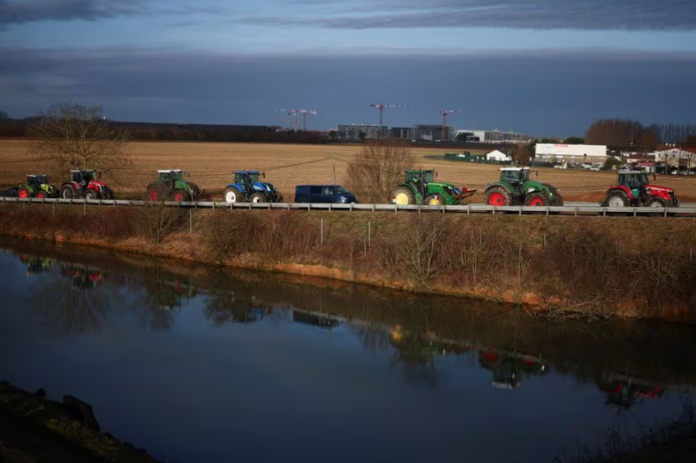French and Belgian farmers set up dozens of blockades on highways and on access roads to a major container port on Wednesday to press governments to ease environmental rules and protect them from rising costs and cheap imports, according to Reuters.
Protests have spread across Europe. Spanish farmers said they would join the movement, while 1,000 Italian farmers were planning to take part in rallies in Brussels on Thursday to press EU leaders meeting in the capital to act. German and Romanian farmers with similar grievances have also taken action.
Farmers say they are not being paid enough, are choked by taxes and green rules and face unfair competition from abroad.
“If we keep on like this, the end of agriculture will mean the end of civilisation,” 28-year-old Belgian farmer Adelin Desmecht said, blaming too much regulation and paperwork.
In France, long lines of tractors edged closer to Paris and its Rungis international food market, a hub for produce for France and beyond and a red line for the government, which has so far not intervened to remove the blockades.
In total, there are about 100 blockades, Interior Minister Gerald Darmanin said, warning protesters not to try to block airports, Rungis or the capital. BFM TV showed standoffs near the Loire river, with tractors stopped by police from getting closer to Paris.
In Belgium, farmers blocked access roads to the Zeebrugge container port. One of the protest organisers, Bruno, who had briefly gone back home to tend to his cows, said more than 100 tractors were taking part in the blockade. A major highway in Belgium was also blocked, according to local media.
French farmers have already won several concessions, including the government dropping plans to gradually reduce subsidies on agricultural diesel.
On Wednesday, European Commissioners proposed limiting agricultural imports from Ukraine and greater flexibility on rules on fallow land in a bid to quell protests.
Imports from Ukraine, on which the EU has waived quotas and duties since Russia’s February 2022 invasion, and renewed negotiations to conclude the Mercosur trade deal with South American countries, have fanned farmers’ discontent about unfair competition in sugar, grain and meat.
EU farmers must normally meet certain conditions including devoting 4% of farmland to “non-productive” areas where nature can recover, though there is already a temporary exemption in response to the Ukraine war and food security concerns.
The protests across Europe come ahead of European Parliament elections in June in which the far right, for whom farmers represent a growing constituency, is seen making gains.
In Italy, farmers have blocked traffic with hundreds of tractors near motorway access points near Milan, in Tuscany and elsewhere in recent days.
Farmers’ lobby Coldiretti said in a statement that more than 1,000 of its members would travel to Brussels to take part in a demonstration on Thursday outside the European Parliament.
While a deal looks possible on fallow land, the question of talks on a major trade deal with the Mercosur group is more contentious.
French Finance Minister Le Maire repeated on Wednesday that Paris does not want the deal to be signed as it is now, due to a lack of guarantees that imported products would have to meet EU rules. But the European Commission has said it was still aiming to conclude a free trade agreement with the South American bloc.
Le Maire also said in an interview with French radio CNews/Europe 1 that he would step up checks on big French and European retailers to ensure they pay French farmers fairly under a law designed to safeguard farm-gate prices.
In another step to try to subdue farmer anger, the agriculture ministry announced 230 million euros in additional aid for French wine producers, who have been squeezed by declining consumption.
The authorities already offered subsidies last year to distil surplus wine stocks into industrial alcohol and to let Bordeaux producers pull up some of their vines.


